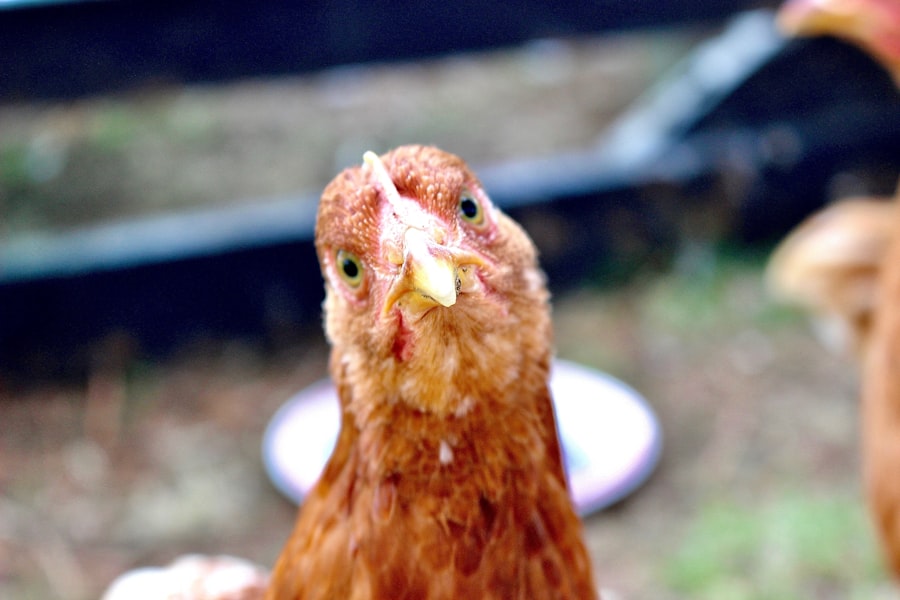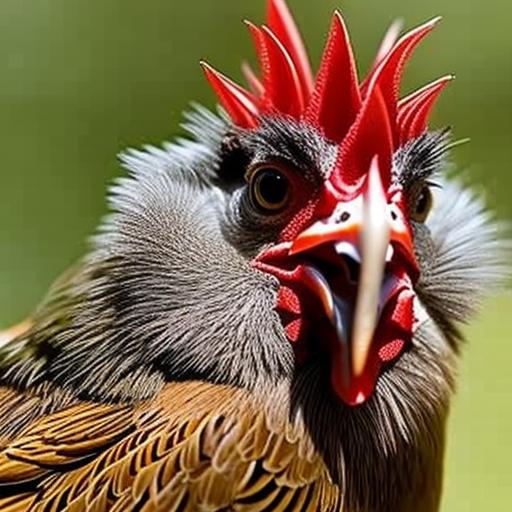Keeping chickens has been a popular practice for centuries, dating back to ancient times when they were first domesticated. Chickens were originally domesticated from the red junglefowl, a bird native to Southeast Asia. Over time, humans began to selectively breed chickens for specific traits, such as egg-laying or meat production. Today, keeping chickens has become a popular hobby for many people, offering a range of benefits including fresh eggs, pest control, and natural fertilizer.
One of the main benefits of keeping chickens is the abundance of fresh eggs they provide. Chickens are prolific layers, with most breeds laying an egg almost every day. This means that you will have a constant supply of fresh, organic eggs right in your backyard. Not only are these eggs delicious and nutritious, but they also have a lower environmental impact compared to store-bought eggs. By keeping chickens, you can reduce your carbon footprint and enjoy the satisfaction of knowing exactly where your food comes from.
In addition to providing fresh eggs, chickens also offer natural pest control. Chickens are omnivorous and will eat a wide range of insects and pests that can be harmful to your garden. They will happily gobble up slugs, snails, beetles, and even small rodents. By allowing your chickens to free-range in your garden or providing them with access to areas where pests are a problem, you can significantly reduce the need for chemical pesticides.
Furthermore, chickens produce high-quality fertilizer in the form of their droppings. Chicken manure is rich in nitrogen, phosphorus, and potassium, making it an excellent natural fertilizer for your plants. By composting chicken manure and using it in your garden, you can improve soil fertility and promote healthy plant growth. This not only saves you money on store-bought fertilizers but also reduces the need for synthetic chemicals that can harm the environment.
Key Takeaways
- Keeping chickens can be a rewarding and enjoyable hobby for anyone interested in sustainable living and fresh eggs.
- Choosing the right breed of chicken is important for meeting your specific needs, whether it be egg-laying, meat production, or simply as pets.
- Building a chicken coop requires careful planning and consideration of factors such as size, ventilation, and predator protection.
- Maintaining chicken health and nutrition is crucial for ensuring a happy and productive flock, with proper feed, water, and preventative measures against common diseases.
- Understanding chicken behavior and social dynamics can help you create a harmonious flock and troubleshoot any issues that may arise.
Choosing the Right Breed of Chicken for Your Needs
When it comes to choosing the right breed of chicken for your needs, there are several factors to consider. The first is the climate in which you live. Some breeds are better suited to cold climates, while others thrive in hot and humid conditions. It’s important to choose a breed that can tolerate the temperature extremes of your region.
Another factor to consider is the amount of space you have available. Some breeds are more suited to confinement and can tolerate smaller living spaces, while others require more room to roam. If you have a small backyard, you may want to choose a breed that is known for being docile and less likely to fly or escape.
If you are primarily interested in egg-laying, then you will want to choose a breed that is known for its high egg production. Breeds such as the Rhode Island Red, Leghorn, and Sussex are all excellent layers and can produce a large number of eggs each year. On the other hand, if you are interested in meat production, then you will want to choose a breed that is known for its fast growth and large size.
Some popular chicken breeds include the Rhode Island Red, which is known for its excellent egg-laying abilities and hardiness. The Leghorn is another popular breed, especially for those who want a high egg production rate. The Sussex is a versatile breed that is known for its ability to adapt to different climates and its good meat quality. Other popular breeds include the Plymouth Rock, Wyandotte, and Orpington.
Building the Perfect Chicken Coop: Tips and Tricks
Building a chicken coop is an essential part of keeping chickens. A well-designed coop provides shelter, protection from predators, and a comfortable environment for your chickens to live in. When building a chicken coop, there are several factors to consider.
Firstly, you will need to gather the necessary materials and tools. The materials you will need include lumber, wire mesh, roofing material, and hardware such as screws and nails. You will also need tools such as a saw, drill, hammer, and wire cutters. It’s important to have all the necessary materials and tools on hand before you start building.
When designing your chicken coop, size is an important consideration. The coop should be large enough to comfortably accommodate your flock, with at least 4 square feet of space per chicken. It should also have adequate ventilation to prevent the buildup of moisture and ammonia from chicken droppings. This can be achieved by adding windows or vents to the coop.
Another important feature of a chicken coop is nesting boxes. These are where your chickens will lay their eggs, so it’s important to provide enough nesting boxes for your flock. Each nesting box should be about 12 inches square and filled with clean straw or wood shavings. It’s also a good idea to place the nesting boxes in a quiet and secluded area of the coop to provide privacy for your hens.
Building a basic chicken coop can be done in a few simple steps. Firstly, you will need to construct the frame of the coop using lumber and screws. Next, you will need to attach wire mesh to the frame to create walls that will keep your chickens safe from predators. Finally, you will need to add a roof and nesting boxes to complete the coop. It’s important to ensure that all parts of the coop are secure and that there are no gaps or holes where predators can enter.
Chicken Health and Nutrition: A Comprehensive Guide
Keeping your chickens healthy is essential for their well-being and productivity. There are several common health issues that can affect chickens, but with proper care and attention, many of these can be prevented or treated.
One common health issue in chickens is mites and lice infestation. These external parasites can cause itching, feather loss, and general discomfort for your chickens. To prevent mites and lice, it’s important to regularly inspect your chickens for signs of infestation and treat them with appropriate insecticides if necessary. Keeping the coop clean and providing regular dust baths for your chickens can also help prevent infestations.
Respiratory issues are another common health problem in chickens. These can be caused by poor ventilation in the coop, exposure to drafts, or viral infections. To prevent respiratory issues, it’s important to provide adequate ventilation in the coop and avoid overcrowding. If you notice any signs of respiratory distress in your chickens, such as coughing or wheezing, it’s important to seek veterinary care as soon as possible.
Feeding your chickens a balanced diet is essential for their overall health and productivity. A balanced diet for chickens should consist of a combination of grains, protein, vitamins, and minerals. Commercial chicken feed is available in different formulations depending on the age and purpose of your chickens. It’s important to provide fresh water at all times and to avoid feeding your chickens spoiled or moldy food.
In addition to their regular diet, chickens can also benefit from supplements and treats. Calcium supplements, such as crushed oyster shells or eggshells, can help prevent calcium deficiencies and promote strong eggshells. Treats such as fruits, vegetables, and mealworms can be given in moderation as a source of enrichment and to encourage natural foraging behavior.
Egg-Laying and Incubation: Everything You Need to Know
Collecting and storing eggs is an important part of keeping chickens. When collecting eggs, it’s important to handle them gently to avoid cracking or damaging the shells. It’s also a good idea to collect eggs frequently to prevent them from becoming dirty or soiled.
Once you have collected your eggs, it’s important to store them properly to ensure their freshness and quality. Eggs should be stored in a cool and dry place, ideally at a temperature of around 45 to 50 degrees Fahrenheit. It’s important to avoid washing eggs before storage, as this can remove the protective coating on the shells and increase the risk of bacterial contamination.
If you are interested in hatching your own chicks, then incubation is the next step. Incubation is the process of artificially creating the conditions necessary for eggs to develop and hatch into chicks. This can be done using an incubator, which provides a controlled environment of temperature and humidity.
The incubation process typically takes around 21 days, although this can vary depending on the breed of chicken. During this time, it’s important to monitor the temperature and humidity levels in the incubator to ensure optimal conditions for development. It’s also important to turn the eggs regularly to prevent the embryos from sticking to the inside of the shell.
Once the eggs have hatched, it’s important to provide proper care and nutrition for the baby chicks. They will need a warm and secure environment, such as a brooder box, with access to food and water. It’s important to provide a balanced diet for the chicks, with a high-quality chick starter feed that is specifically formulated for their nutritional needs.
The Art of Chicken Breeding: Tips and Techniques

Breeding chickens can be a rewarding experience, but it requires careful planning and consideration. The first step in chicken breeding is selecting suitable breeding stock. This involves choosing chickens that have desirable traits such as good egg-laying ability, meat quality, or specific color patterns.
When selecting breeding stock, it’s important to choose chickens that are healthy and free from genetic defects or diseases. It’s also important to choose chickens that are unrelated or only distantly related to prevent inbreeding and maintain genetic diversity.
There are two main methods of chicken breeding: natural mating and artificial insemination. Natural mating involves allowing roosters and hens to mate naturally, while artificial insemination involves collecting semen from a rooster and manually inseminating the hens.
Natural mating is the most common method of chicken breeding and is suitable for most backyard breeders. It allows for natural selection and genetic diversity, as well as the opportunity for chickens to exhibit natural mating behaviors.
Artificial insemination is a more advanced breeding technique that is often used in commercial breeding operations or for specific breeding programs. It allows for more control over the breeding process and can be used to breed chickens with specific traits or to preserve rare or endangered breeds.
Once the eggs have been fertilized, they can be incubated to hatch into chicks. The incubation process is the same as described earlier, with the eggs being placed in an incubator and provided with the necessary temperature and humidity conditions for development.
Raising Chickens for Meat: A Beginner’s Guide
Raising chickens for meat is a popular practice for many people who want to have a sustainable source of high-quality meat. When it comes to raising chickens for meat, there are several factors to consider.
The first step in raising chickens for meat is choosing the right breed. There are several breeds that are specifically bred for meat production, such as the Cornish Cross or the Freedom Ranger. These breeds are known for their fast growth and high meat yield.
Once you have chosen a breed, you will need to provide proper housing and care for your meat chickens. They will need a clean and spacious coop or brooder box, with access to food and water at all times. It’s important to provide a balanced diet that is specifically formulated for meat chickens, as this will ensure optimal growth and development.
When it comes time to process your meat chickens, it’s important to do so in a safe and sanitary manner. This involves slaughtering the chickens quickly and humanely, and then properly processing the meat. It’s important to follow all local regulations and guidelines for meat processing, and to take the necessary precautions to prevent contamination and foodborne illnesses.
Chicken Behavior and Social Dynamics: Understanding Your Flock
Understanding chicken behavior and social dynamics is essential for keeping a happy and healthy flock. Chickens are social animals that live in hierarchical groups known as flocks. Within a flock, there is a pecking order, which determines the social status of each chicken.
The pecking order is established through a series of aggressive behaviors, such as pecking, chasing, and wing flapping. The dominant chickens will assert their dominance over the subordinate chickens, and this hierarchy helps to maintain order within the flock.
It’s important to understand the pecking order and social dynamics of your flock to ensure that all chickens are getting along and are not being bullied or injured. If you notice any signs of aggression or bullying, it’s important to intervene and separate the chickens if necessary.
Chickens also exhibit a range of other behaviors that can provide insight into their health and well-being. For example, chickens will often dust bathe, which involves rolling around in dirt or sand to clean their feathers and remove parasites. This behavior is natural and should be encouraged by providing a designated dust bathing area in the coop or run.
Chickens also have a natural instinct to forage for food. They will scratch at the ground with their feet, looking for insects, seeds, and other tasty treats. Providing opportunities for natural foraging behavior can help keep your chickens entertained and prevent boredom.
It’s important to handle your chickens gently and with care to avoid causing them stress or injury. Chickens can become tame with regular handling and can even be trained to come when called or perform simple tricks.
Troubleshooting Common Chicken Problems: A Quick Reference Guide
Keeping chickens can sometimes come with its fair share of challenges and problems. However, with a little knowledge and preparation, many of these problems can be easily resolved.
One common problem that chicken keepers may encounter is egg-laying issues. This can include problems such as soft-shelled eggs, no eggs, or abnormal egg production. Soft-shelled eggs are often caused by a lack of calcium in the diet, so it’s important to provide a calcium supplement such as crushed oyster shells or eggshells. If your chickens are not laying eggs at all, it could be due to stress, illness, or environmental factors. It’s important to address any underlying issues and provide a comfortable and stress-free environment for your chickens.
Health problems can also occur in chickens, such as mites, respiratory issues, or infections. Mites and lice can be treated with appropriate insecticides and regular cleaning of the coop. Respiratory issues can be prevented by providing adequate ventilation and avoiding overcrowding. If you notice any signs of illness in your chickens, such as lethargy, loss of appetite, or abnormal behavior, it’s important to seek veterinary care as soon as possible.
Coop and environmental issues can also arise, such as predator attacks or temperature control problems. It’s important to secure your coop against predators by using sturdy fencing and locks. Providing adequate insulation and ventilation in the coop can help regulate temperature and prevent heat stress or frostbite.
Recommended Reading: The Best Books on Keeping Chickens and Chicken Coops
If you’re interested in learning more about keeping chickens and building chicken coops, there are several great books available that can provide you with all the information you need. One highly recommended book is “Storey’s Guide to Raising Chickens” by Gail Damerow. This comprehensive guide covers everything from choosing the right breed of chicken to building a coop and caring for your flock. Another excellent resource is “The Chicken Health Handbook” by Gail Damerow, which focuses specifically on keeping your chickens healthy and preventing and treating common ailments. For those interested in building their own chicken coop, “DIY Chicken Coops” by Samantha Johnson and Daniel Johnson offers step-by-step instructions and design plans for a variety of coop styles. Overall, these books are essential reads for anyone looking to start or improve their chicken-keeping journey.
If you’re interested in learning more about turning a shed into a chicken coop, you’ll definitely want to check out this informative article from Poultry Wizard. It provides step-by-step instructions and helpful tips on how to transform a shed into a cozy home for your feathered friends. Whether you’re a beginner or an experienced chicken keeper, this article is a must-read for anyone looking to create the perfect chicken coop. Click here to read the full article and start your chicken coop transformation today.
FAQs
What are the best books on keeping chickens?
There are several great books on keeping chickens, including “Storey’s Guide to Raising Chickens” by Gail Damerow, “The Joy of Keeping Chickens” by Jennifer Megyesi, and “Chicken Health Handbook” by Gail Damerow.
What topics do these books cover?
These books cover a range of topics related to keeping chickens, including breed selection, coop design, feeding and nutrition, health and disease prevention, and egg production.
Are these books suitable for beginners?
Yes, these books are suitable for beginners as they provide comprehensive information on all aspects of keeping chickens, including basic care and maintenance.
Can these books be used as reference guides?
Yes, these books can be used as reference guides as they provide detailed information on a wide range of topics related to keeping chickens.
Where can I purchase these books?
These books can be purchased online through retailers such as Amazon, Barnes & Noble, and Books-A-Million, as well as in many local bookstores.
Meet Walter, the feathered-friend fanatic of Florida! Nestled in the sunshine state, Walter struts through life with his feathered companions, clucking his way to happiness. With a coop that’s fancier than a five-star hotel, he’s the Don Juan of the chicken world. When he’s not teaching his hens to do the cha-cha, you’ll find him in a heated debate with his prized rooster, Sir Clucks-a-Lot. Walter’s poultry passion is no yolk; he’s the sunny-side-up guy you never knew you needed in your flock of friends!







